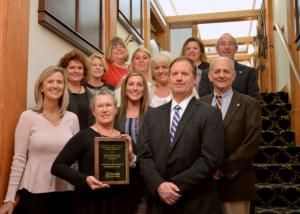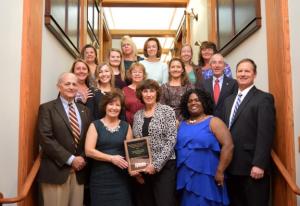Beebe Healthcare recognizes teams with annual quality and safety awards
Beebe Healthcare recognized employees and physicians for their dedication and commitment to high-quality patient care during the eighth annual Quality and Safety Awards Banquet held Nov. 1 at Kings Creek Country Club.
The evening represented the culmination of a year's work by 26 teams, made up of more than 200 Beebe team members. The teams designed and implemented process improvement initiatives to positively impact the quality of patient care at Beebe.
When the awards program started in 2009, there were three teams who entered projects. For the past two years there have been 26 projects submitted. Three of the 26 teams were presented with awards for their outstanding projects, which solved quality or safety problems identified in a hospital setting.
"Each year, we are thrilled to see the innovative and thoughtful ideas that our team members come up with to improve our internal processes and systems for the benefit of our patients. We also are thrilled to see how the number of teams has increased," said Jeffrey M. Fried, FACHE, president and CEO of Beebe Healthcare. "We look for teams that identify problems on their own, and look at quality and data to drive performance improvement. It is these efforts that are driving us toward our vision of becoming a high-reliability organization. The three teams that received awards demonstrated the ability to go above and beyond."
Stephen Fanto, MD, chairman of the board of directors’ Quality and Safety Committee, introduced the three teams, which then formally presented their project goals, methodologies and solutions.
"It is an honor to work with these teams and see the innovation they bring to the organization each year," said Fanto. "Myself and the entire Quality and Safety Committee thank you for your dedication to Beebe and to improving the quality of patient care every day."
Fanto and Fried presented the awards with David A. Herbert, chairman of the Beebe board of directors.
The three award-winning teams were: Falls Prevention Team, Safe Patient Handling with the Lift Team, and the Neonatal Abstinence Syndrome Team.
The Fall Prevention Team put many action plans in place to reduce patient falls throughout the hospital.
"Beebe Healthcare's inpatient units really shine, performing near the top 10th percentile nationally according to NDNQI [National Database for Nursing Quality Indicators] data," said Holly Heilner, RN, CPHQ, CSSGB, chairwoman of the hospital Fall Prevention Team. "The third-floor medical-surgical team, which decreased patient falls by 75 percent over the past two years, is the real star of the show – performing better than the top 10 percent nationally!"
"We focus on creating a culture of safety," said Margaret Porter, MSN, RN-BC, nurse manager for the Medical-Surgical Unit 3MS. "It can be hard to go 100 days without a patient fall and then have a fall. When this does happen, we teach our teams to learn from those incidents and look for lessons learned to prevent future falls."
"Having a patient fall is devastating for both the patient and the team," said Porter. "Since most falls happen around toileting, our staff is very proactive. Our nursing team is rounding hourly and offering the patients assistance to the bathroom. All nursing staff is vigilant when it comes to responding to patient call bells and safety alarms."
It is one of Beebe's top priorities to prevent patient falls by focusing on a team concept that includes "everyone, every patient, every time," Porter said.
Fall prevention is one of the top priorities at Beebe. This was evident from the two projects focusing on patient safety and fall prevention, and the project by the Lift Team, which looked at employee health and safety both in preventing falls and when helping patients up after a fall.
Tara Cooper, MSN, RN, started the project as part of her master's program. She and teammate Jamie Dickerson, MSN, MBA, RN, created the Lift Team, which is utilized to prevent nursing sprains, strains and injuries, and assist with lifting, transferring and mobilizing patients. Their assistance helps to prevent falls and staff injuries.
The team did a pre-implementation survey to get an understanding of the number of team members who were either injured or felt they had no help when helping up a patient who fell. Then they implemented a Lift Team – a designated group of team members who received special training on helping patients up – and then after 30 days, they sent out a post-implementation survey.
"The data was overwhelmingly positive," Cooper said. "We found that job satisfaction went up considerably – by 40 percent. We also found that lifting injuries decreased by 52 percent." The next step for the Lift Team is to train new members so they can institute the program throughout the hospital.
"We want to move toward becoming a No Lift facility," Cooper said.
As the opioid crisis in America continues to expand, its impact is being felt on pregnant women, their babies and those who care for them. Bridget Buckaloo, MSN, RN, executive director of Women's and Children's Services at Beebe, presented findings her team has been working on for the past several years.
Neonatal Abstinence Syndrome is characterized by babies who are born with a constellation of symptoms of withdrawal from opioids. At Beebe Healthcare, this rising trend started prior to 2012. Nationwide, there has been a 300 percent increase in the number of babies born with NAS from 1999 to 2013. At Beebe, NAS affects about 3 percent of babies annually.
From 2011 to 2016, 5,247 babies were born at Beebe. Of those, 174 had NAS symptoms. In addition to treatment for the babies experiencing withdrawal, the team also works with the moms who often have psychosocial concerns and need additional resources.
The team put a structure in place to work with the moms in an effort to educate, help them find resources, and keep the babies with the parents.
"We put together an agreement that the moms sign. This is a mutual purpose agreement that states that we all want what is best for the baby and that the mom agrees to be part of the team," Buckaloo said. "We also put a baby huggers program in place utilizing retired nurses who were in our volunteer pool at Beebe. They have the skill to understand the complexities of the medical issues of NAS, and also the understanding and compassion to work with the mothers."
The team noted that in 2013, each NAS baby cost the healthcare system about $38,000. In 2017, that cost has been reduced through the team's protocols to about $21,000 per baby.
"As a member of the Delaware Perinatal Board, I can say that when other hospitals see our numbers, they ask what we are doing right," said Buckaloo. "The data we are seeing now shows how hard the team has worked and how successful we have been in managing NAS babies. The Beebe program has become a model for the state.






















































